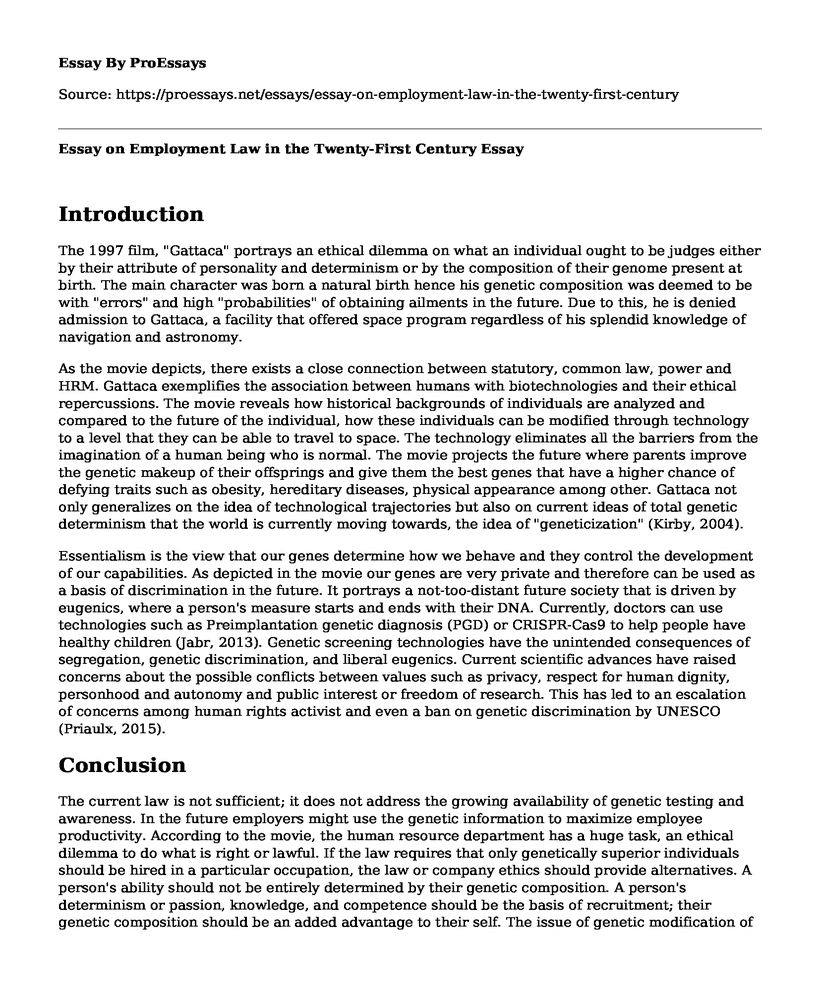Introduction
The 1997 film, "Gattaca" portrays an ethical dilemma on what an individual ought to be judges either by their attribute of personality and determinism or by the composition of their genome present at birth. The main character was born a natural birth hence his genetic composition was deemed to be with "errors" and high "probabilities" of obtaining ailments in the future. Due to this, he is denied admission to Gattaca, a facility that offered space program regardless of his splendid knowledge of navigation and astronomy.
As the movie depicts, there exists a close connection between statutory, common law, power and HRM. Gattaca exemplifies the association between humans with biotechnologies and their ethical repercussions. The movie reveals how historical backgrounds of individuals are analyzed and compared to the future of the individual, how these individuals can be modified through technology to a level that they can be able to travel to space. The technology eliminates all the barriers from the imagination of a human being who is normal. The movie projects the future where parents improve the genetic makeup of their offsprings and give them the best genes that have a higher chance of defying traits such as obesity, hereditary diseases, physical appearance among other. Gattaca not only generalizes on the idea of technological trajectories but also on current ideas of total genetic determinism that the world is currently moving towards, the idea of "geneticization" (Kirby, 2004).
Essentialism is the view that our genes determine how we behave and they control the development of our capabilities. As depicted in the movie our genes are very private and therefore can be used as a basis of discrimination in the future. It portrays a not-too-distant future society that is driven by eugenics, where a person's measure starts and ends with their DNA. Currently, doctors can use technologies such as Preimplantation genetic diagnosis (PGD) or CRISPR-Cas9 to help people have healthy children (Jabr, 2013). Genetic screening technologies have the unintended consequences of segregation, genetic discrimination, and liberal eugenics. Current scientific advances have raised concerns about the possible conflicts between values such as privacy, respect for human dignity, personhood and autonomy and public interest or freedom of research. This has led to an escalation of concerns among human rights activist and even a ban on genetic discrimination by UNESCO (Priaulx, 2015).
Conclusion
The current law is not sufficient; it does not address the growing availability of genetic testing and awareness. In the future employers might use the genetic information to maximize employee productivity. According to the movie, the human resource department has a huge task, an ethical dilemma to do what is right or lawful. If the law requires that only genetically superior individuals should be hired in a particular occupation, the law or company ethics should provide alternatives. A person's ability should not be entirely determined by their genetic composition. A person's determinism or passion, knowledge, and competence should be the basis of recruitment; their genetic composition should be an added advantage to their self. The issue of genetic modification of human ought to bring around immense inequality. Humans are still struggling with applying fundamental values such as fairness, equality justice, and autonomy. The issues of a technology that creates a human with sharply enhanced strengths of basic merits attributes such as physical strength, qualities of mind and emotions that promise better productive efforts will see the world turn into a monster (Wake, 1999).
References
Jabr, F. (2013, October 28). Are We Too Close to Making Gattaca a Reality? Retrieved March 15, 2018, from Scientific American: https://blogs.scientificamerican.com/brainwaves/are-we-too-close-to-making-gattaca-a-reality/
Kirby, D. (2004). Extrapolating Race in Gattaca: Genetic Passing, Identity, and the Science of Race. Project Muse, 184-186.
Priaulx, N. (2015, March 30). Gattaca and genetic discrimination in employment - much ado about nothing? Retrieved March 15, 2018, from The LawLa Research Centre: http://sites.cardiff.ac.uk/law-lab/2015/03/30/gattaca-and-genetic-discrimination-in-employment-much-ado-about-nothing/
Wake, F. (1999). The Impact Of Genetic Enhancement On Equality. Wake Forest Law Review, 561-590.
Cite this page
Essay on Employment Law in the Twenty-First Century. (2022, Apr 07). Retrieved from https://proessays.net/essays/essay-on-employment-law-in-the-twenty-first-century
If you are the original author of this essay and no longer wish to have it published on the ProEssays website, please click below to request its removal:
- Paper Example on Ethics and Persuasion
- Diversity Democracy Dissent Essay Example
- Paper Example on Online Stalking
- Essay on Importance of Morality in Business
- Rising Crime: A Result of Unemployment of Youth - Essay Sample
- Essay on Diverting Domestic Violence Misdemeanors in Florida Prisons & Road Camps
- Paper Example on Nightcrawler 2014: A Thriller of Betting Nerves and Exploiting Ambition







